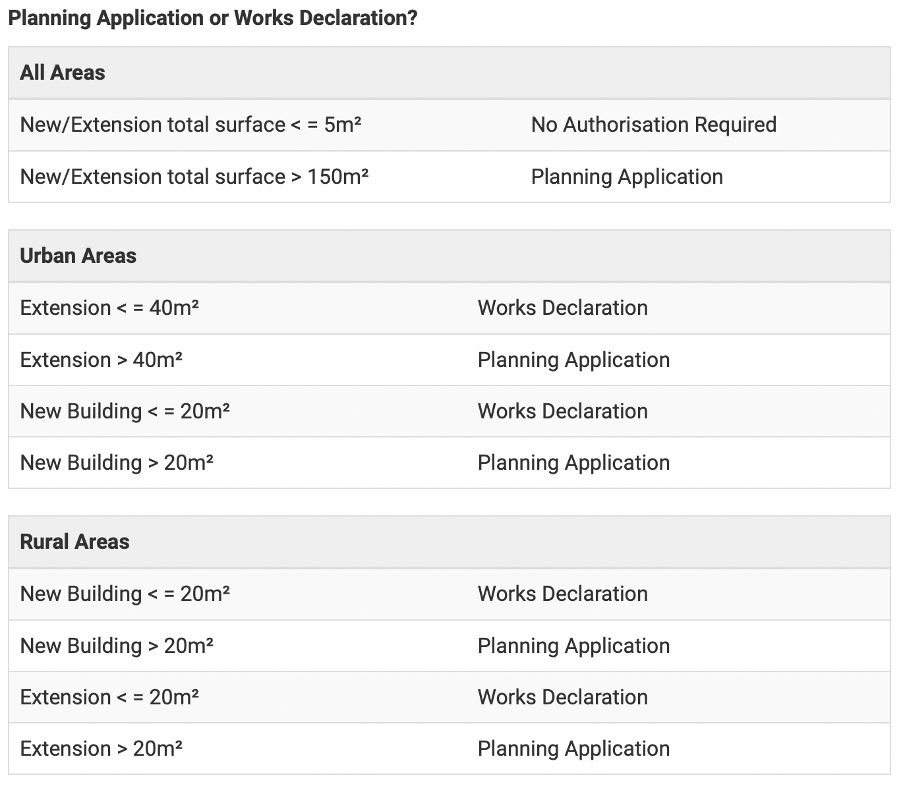Buying a property in France is the ultimate dream for many who picture their retirement years sipping fine wines on their sunny terrace, perhaps overlooking a glorious countryside filled with lavender fields, or a beach with gentle waves and golden sand.
However, if your property dreams involve substantial alterations to an existing building you’ve got your eye on, you’re first going to have to overcome the challenges surrounding French planning permission.
Understanding French Planning Permission
In almost all cases, formal planning consent is required from the local planning authority for all brand new constructions, as well as when proposed works to existing buildings would create new surface levels or increase the external surface area. In addition, you will also need to seek planning permission from the local planning authority for a change of use of an existing property.
In order to obtain the required building permit, you will need to submit either a planning application (known as a demande de permis de construire), or a works declaration (known as a demande de déclaration préalable).
French-Property.com provides the following table which outlines when you will need a permis de construireand when a déclaration préalable.
(Image source: french-property.com)
This table is, however, only a summary and must be read in conjunction with all other relevant planning literature. Key amongst this will be the local planning regulations contained in the plan local d’urbanisme (PLU), which you can obtain from the local mairie (i.e., local town hall).
In rural areas, the PLU is sometimes replaced with a simplified version known as a carte communale. In all cases, you will need to obtain this information from the local council.
Acquiring Planning Permission in Conservation Areas
As you might expect, there are certain laws that govern building works in conservation areas, to listed buildings, and to areas within half a kilometre of a listed building.
The truth is that few, if any, dispensations are available should you seek planning permission to build on these areas. However, property owners should consult the local authority to obtain the full details of any restrictions.
Minor Renovations to Existing Property
Where the renovations you expect to carry out are minor, there are cases where you will not need to submit a planning application to obtain consent. As a general rule, you won’t need to declare any work you wish to carry out or obtain planning permission if the area or building you are renovating is less than 2m2.
If the area is between 2m2 and 20m2, then you must fill out the déclaration préalable to declare that you are carrying out the work.
For anything over 20m2, you will need a building permit from the planning authority.
However, it’s not always 100% clear which rules apply in which cases. As such, you should seek a trusted advisor to guide you through the process, and always consult the local mairie to ensure you don’t break the law.
Penalties and Consequences for Non-Compliance
Under French law, it is a criminal offence to undertake building works that require planning permission without obtaining consent from the planning authority.
For non-compliance, the penalty is a fine up to €300,000 plus two years in prison – so it is imperative that you follow the rules and abide by the law.
Charles Mackintosh – South of France Property Surveyor
Navigating the rules and regulations surrounding French planning permission is a tricky business to say the least – particularly if you don’t speak the language. The best advice is to seek the assistance of a trusted professional.
Charles Mackintosh is a property surveyor based in the South of France. With over 30 years’ experience living and operating in the region, Charles provides highly regarded English language property surveys and advice to overseas buyers. Get in touch today for more information.

